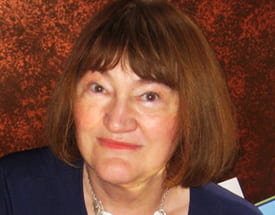Dr Margaret Mallett (1941-2017)
Emeritus Fellow of the English Association

After teaching in Northumberland, Kent and south London, Margaret came to Goldsmiths in 1970 as one of two Research Officers on the Schools Council English in Middle Years project. When the project ended she took up a part-time post in the English department and was later a Senior Lecturer in the Education Department working on BA Ed. English Curriculum courses and on the MA in Education course for practising teachers.
Margaret believed that there was nothing more important than her students or the children she encountered in school, thinking herself first and foremost as a teacher of the under 11s. She aimed, in her lectures and seminars and in her writing, to show how evidence from the best research could inform classroom practice and how the best classroom practice informed the researcher. She devoted her career to doing all she could to equip her students for the classroom so that all the children coming into their care had the excellent experience they deserved. She felt that this involved equipping students with a deep understanding of the principles that underpin good practice, with an understanding of the nature of that good practice and with an appreciation of how these worked together. She loved being with her students on teaching practice and often said how much she learned from them.
When the need arose she was a swift and effective administrator but there was always a sense that she did not regard administration as a ‘proper job’ when there were students to be helped. This meant never seeking roles which would have taken her away from teaching. Despite her commitment to teaching Margaret did not neglect her writing and had work published from the early 1970s right up until her last few days. Much to her surprise her report on the Schools Council Project ‘Talking, Writing and Learning 8-13’ was in a Myra Barrs’ list ‘My eleven best books about education’ when she had thought it long forgotten. Her first round of books grew out of her work for a London Institute of London PhD. Making Facts Matter, Young Researchers and Early Years Non Fiction. She was thus a relative pioneer in the ‘Cinderella field’ of children’s non-fiction literature. Young Researchers won a United Kingdom Reading Association Author Award in 2001 for its contribution to understanding children’s literacy development. You will not find her model of non-fiction learning or her other thinking about non-fiction texts acknowledged in government guidance but it is there and, as I can see from my grandchildren’s daily tasks, very much part of today’s primary curriculum. She helped make this kind of literacy as important as reading fiction.
When she retired she took up a challenge from the students in one of her groups….to write a comprehensive book covering all aspects of primary English. This led to one of Margaret’s most successful books The Primary English Encyclopedia, the fifth edition was published earlier this year. David Wray wrote in the first edition that it was a volume that seemed as if it might be beyond one person but yet gave readers most of what they needed, whetted their appetite and inspired them to pursue some topics in greater depth. There are both short and extended entries, it is evidenced based, full of classroom examples and written in a scholarly but conversational style which aimed readily to reveal meaning. There were two other books Choosing and Using fiction and Non Fiction 3-11 published in 2010. This won the 2011 United Kingdom Literacy Association Author Award. A second edition will emerge in due course. And, published in 2016, a Guided Reader to Early Years and Primary English Creativity, Principles and Practice was written to be a resource for those wishing to deepen their understanding of Early Years and primary English education. There was also in the sixteen years since she retired a steady stream of articles and reviews for Books for Keeps, The School Librarian and English 4-11, the English Association’s journal where Margaret was a team editor. She was an Emeritus Fellow of The English Association and the Association has instituted The Margaret Mallett Award for Children’s Non Fiction.
Margaret retained her deep desire to help and inspire students and young teachers to the very end of her life and notwithstanding the love and support she gave me, her daughters and her five grandsons she was above all else a writer.
David Mallett
May 2017